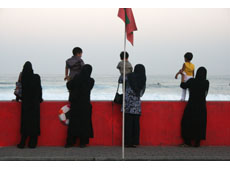The United Nations in Maldives launched its new project, the ‘Low Emission Climate Resilient Development (LECReD) Programme’ in Fonadhoo, Laamu atoll yesterday (May 18).
Azusa Kubota, United Nations Development Programme (UNDP) representative, said the ambitious programme would set Laamu atoll as a “benchmark” for future climate-smart and strategic development.
Minister of Environment and Energy Thoriq Ibrahim echoed the statements of Kubota, stating that the programme would play a pivotal role in shaping the future development of Laamu atoll, paving way for more climate-resilient projects in the social and economic sectors of the atoll.
The 3-year-long initiative seeks to contribute to the existing local development framework by enhancing the capacity to support low-carbon lifestyles, climate change adaptation, and disaster risk reduction in the Maldives.
The US$9.2 million programme will be implemented as a collaborative effort by local organisations, the UNDP, UNICEF, UNOPS, UNFPA, UN WOMEN, the WHO and the FAO.
It is the first joint implementation programme undertaken by the UN in the Maldives, and signals the adoption of a new holistic approach to address localised impacts of climate change in the Maldives, according to the LECReD press statement.
The Government of Denmark, who is funding the project, have a history of supporting the Maldives in climate change awareness and mitigation programmes.
In 2009 Copenhagen supported the Maldives in order that the government could attend the crucial climate change summit, just one day after the former president Nasheed announced that country lacked the funds to participate.
Furthermore, in 2010 Danish ministers announced they would assist with climate mitigation in Maldives during an official visit.
Speaking at a press conference held at the time, officials announced Denmark would fund climate mitigation programs in Kenya, Indonesia and the Maldives as part of its US$40 million ‘fast-track’ climate change initiative.
Danish Minister for Development Cooperation Søren Pind and Minister for Climate Change and Energy Dr Lykke Friis announced they would assist with infrastructure and capacity-building projects in the Maldives.
“In global climate talks there is sometimes the tendency to say ‘If we don’t agree now, we’ll just agree next year.’ But if anyone suffers from that illusion they should come to the Maldives, because here you get an education that action is needed now,” said Dr Friis.
Following the latest Intergovernmental Panel on Climate Change (IPCC) report, Minister Thoriq called for a cap on global temperature rise, and pledged to increase renewable energy to 30% in the next 5 years.
“Averting catastrophe is still possible,” he said in response to the panel’s argument that the world was ill-prepared for risks from a changing climate.
After reports of collapsing glaciers leading to a potentially increased rate of sea-level rise were reported last week, local NGOs suggested that the Maldives was “not prepared at all” for the projected consequences.


